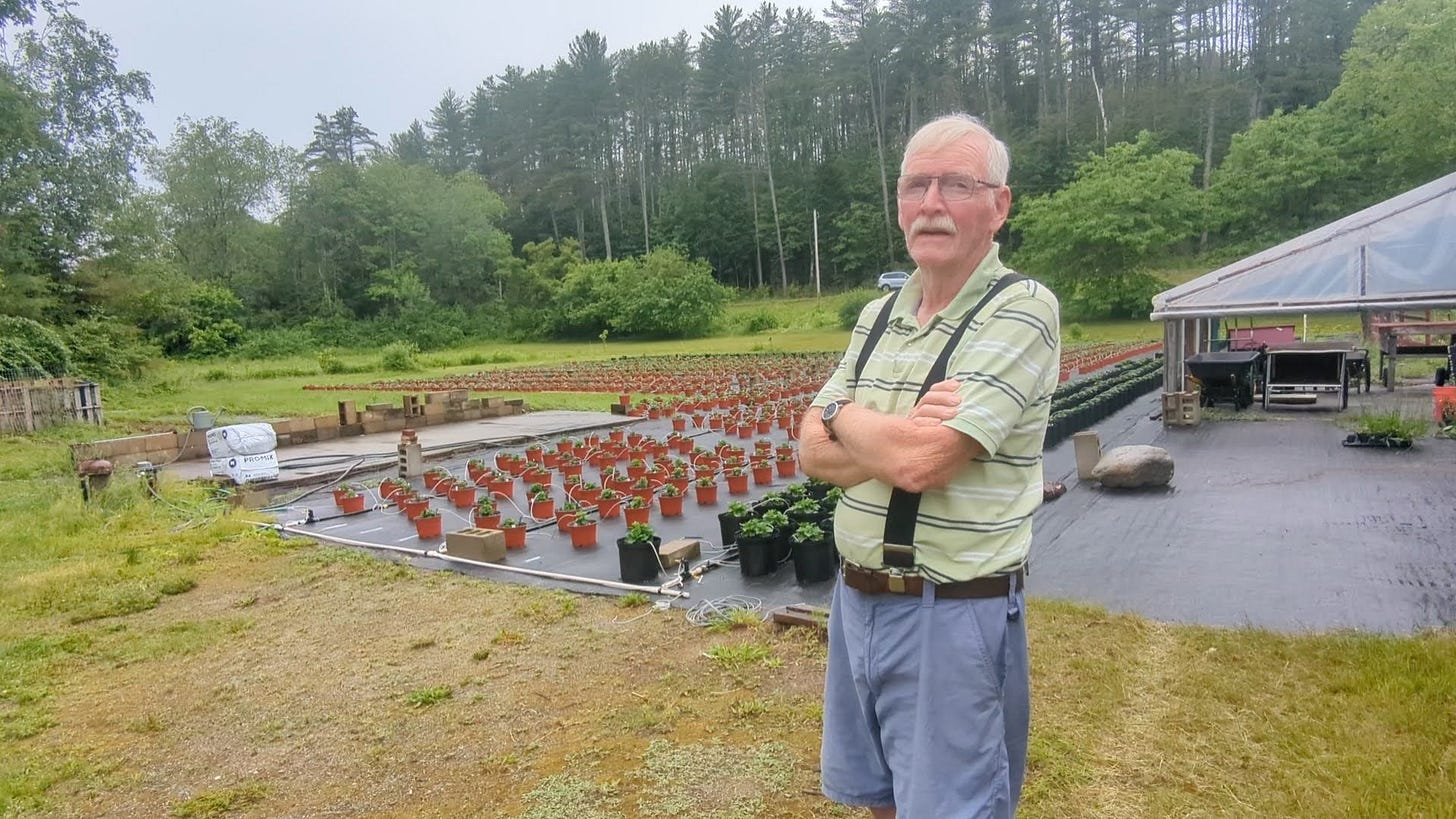Maidstone: Tim White
I follow Route 102 South from the Whittaker residence. After hugging the Connecticut River for a few minutes, my right side opens up into broad, rich looking fields, some with corn, but mostly hay. Soon, I cross into Maidstone, which I know primarily because of the state park at Maidstone Lake. In 2016, we spent Memorial day weekend camping on the lake. As we were driving down the access road, we saw someone walking down the road wearing a beekeeper’s suit. When we went to set up camp, we realized that the suit was not for bees, but for the black flies, which immediately swarmed us. They got in our eyes, our mouths, buzzed around our ears. Unlike mosquitos, when black flies bite, they cut the skin, leaving welts, sometimes bloody and huge inflammations. We alternated our time in the only safe places, the tent or the water. Still, it is one of the most remote and beautiful lakes of Vermont, and I fondly remember the calls of the loons at night.
As I pass the entrance to the lake, I briefly consider stopping there for the night. It’s getting late in the afternoon and I am tired. I hadn’t expected this trip to be so much work. As a teacher, I thought that I would find these interviews easy and enjoyable, but the late afternoon finds me exhausted. I decide to push on for one more town, however.
The Maidstone Town Hall is a simple, one story building, closed for the day. I continue toward the southern end of town without seeing a single person. Just before I reach the town border, I see a sign that reads, “Plants for sale.” I pull in to a long curving driveway and stop in front of a simple shed and a yard covered with neat rows of potted plants. The stand is completely unattended. On the side of the shed are instructions for how to choose and pay for the plants. As I’m parked there, considering how I might find someone in the town to speak with, a slender, white haired man with a walrus mustache, wearing a pair of shorts held up by dark suspenders comes out of the house. After hearing about my project, he agrees to speak with me, standing in the light rain, in front of his field of plants.
Tim White, who came to Maidstone in 1975 from upstate New York has a slow, soft voice. He answers my questions deliberately, after giving each one considerable thought. He describes Maidstone as a small stable place. The paper mill used to own the land around the lake and lease the lakefront property as camps to people for practically nothing. When it shut down, the state took over the land but allowed the camp owners to purchase their little bits of land. Now, those camps are worth fortunes. With no public services to speak of, and an income from the lake, the town sees little controversy. There are no dairy farms left, the last herd of cows was recently sold off, but the fields are used for growing; the one next to him is given over to potatoes. Tim describes the paradox of the people of the town. “I haven’t seen my neighbors for years,” he says, “but I consider them to be good friends.” When asked about local characters, Tim speaks fondly of the past Sheriff, John Irwin. Irwin bought the land next to Tim when it came up for auction by not telling anyone about the auction. Then he used inmates from the county jail to illegally clear the land. He tells another story about how Irwin bought a new, expensive truck, but hid it in the woods for six months from his wife, who was in control of the family finances, until he judged the time was right to let her know. Aside from his financial misdeeds, though, Irwin was beloved by the community. Tim recalls how the Sheriff came by and helped him build his house, laying the brick for his chimney, and how Irwin advised Tim on the placement of the driveway, to make it a pleasing curve instead of coming straight down to the house.
Asked about the essential nature of living in Maidstone, Tim emphasizes the quiet, solitary nature of life there. “You have to make your own entertainment,” he says. He also talks about being willing to accept a lower lifestyle - “a different lifestyle,” he corrects himself. People here have to scrape together a living. “At one time, I was a bus driver, a teacher, a coach, and a gardener. I sold firewood and plowed roads.” As we’re wrapping up our conversation, a large branch falls from the tree in front of his house, the tree he planted when he first arrived, in 1975. “Good thing we were over here,” he dryly observes.




